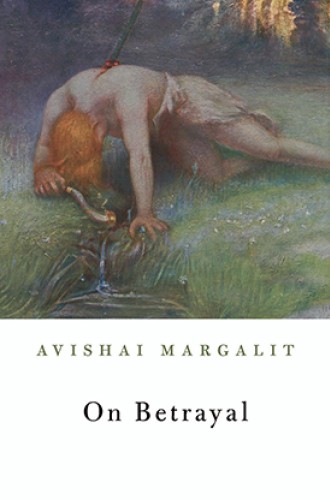We should, I believe, be judged by our compromises more than our ideals and norms. Ideals tell us something important about what we would like to be. But compromises tell us who we are.” Avishai Margalit wrote these words about his 2013 book On Compromise and Rotten Compromises. For Christians, it may be a discomforting message. But it has the ring of realism and, I suspect, is what most moral discernment and direction can achieve.
Compromise is a way station toward the subject of Margalit’s current book: betrayal, an ethical fault beyond possibility of compromise. Margalit, who has taught at the Hebrew University of Jerusalem and the Institute for Advanced Study in Princeton, is an analytic philosopher. But he believes that ordinary language speakers are generally much sharper about making distinctions than abstract moralists. This is particularly true in matters of conduct, where our ability to qualify, justify, and excuse our behavior has been honed by centuries of practice. On Betrayal is a continuous exercise in locating the subtleties within our considered moral judgment. When does compromise descend into betrayal?
Read our latest issue or browse back issues.
To understand betrayal, Margalit distinguishes between “thick” and “thin” human relations. Family and friends are the exemplars of thick relations, but the notion is often extended to nations, organizations, and causes. Religious affiliation is presumed to be familial in two senses: it consists of thick relations not only between believers but also linking the community of believers with God. A religious affiliation that fails to realize a familial sense may fail as a religion, no better than a business that touts its “family” of customers.
Margalit designates thick relations as the purview of ethics. In contrast, morals are directed at more distant manners and customs and even out to the nonhuman world of animals and the environment. Given the distinction between thick and thin relations, Margalit locates betrayal as an irredeemable ethical failure because it directly destroys thick relations.
Margalit incisively analyzes distinctions within our moral and ethical discourse, but this book is not a mere excavation of the Oxford English Dictionary. Extended discussion of examples from history and literature illuminate his arguments. These examples demonstrate that betrayal comes in various colors, from family betrayal to political treason and religious apostasy. His lively (and amusing) account of family betrayal will easily resonate with readers. Not only do we have our personal experience of thick relations but we also know family disaster, which has been richly delineated from Aeschylus to romance novels.
The current political situation in the United States lends special pertinence to Margalit’s analysis of institutional betrayals: treason and apostasy. Regarding treason, he offers a fascinating juxtaposition of the actions of the Norwegian Vidkun Quisling and the French Marshal Pétain, both national leaders under Nazi occupation. The Nazis offered two basic choices: total German control or collaboration that allowed some limited form of national governance.
Quisling, who was a Nazi sympathizer before the invasion, chose the former option. He worked under direction from the Reich commissioner to give total support to Nazi war aims and interests—including eventual deportation of Norwegian Jews. He was convicted after the war of treason, and the word quisling has become a synonym for traitor.
Pétain’s case, in contrast, shows the effect of historical perspective on the charge of treason. At the beginning of the occupation, when Nazi military threat was ever present, the great majority of French people approved of Pétain’s collaboration. But when fortune turned against the Germans later in the war, Pétain was regarded as a traitor and scores of Frenchmen suddenly discovered they had been resistance fighters all along. When is collaboration treason? As history changes, compromise becomes rotten compromise becomes betrayal.
Regarding apostasy, Margalit offers an extended discussion of Judas and Peter. If Judas is the historical figure of betrayal, what should we say about Peter’s thrice-over denial of Jesus? Margalit begins by noting that the Bible is full of stories of betrayal: Jacob betrays Esau, Joseph’s brothers sell him into slavery, and “David’s family is in general a mess.” Old Testament stories generally involve thick family relations. Judas’s and Peter’s relationship to Jesus was friendship, “albeit friendship of an extraordinary kind.”
Yet, we regard Judas and Peter very differently from one another. When Peter denies that he is Jesus’ friend, he fails to show expected loyalty. Presumably he is afraid that showing loyalty in the high priest’s courtyard, in the very shadow of Jesus’ trial, will put his life at risk. “The spirit is willing but . . .” Understanding his fear, we withdraw our judgment of betrayal.
What is it about Judas’s actions that mark them with what Wittgenstein called the “deep and sinister” character of betrayal? It is the kiss. Thick relations are betrayed when actions directly attack that relation. Jesus greets Judas, “Friend, wherefore art thou come?” (Matt. 26:47), and Judas betrays him with the very sign of friendship.
Judas betrays Christ—the apostate betrays Christianity. But in many cases, the connection between apostasy and betrayal is less clear. Consider “the case of Brother Daniel,” a Polish Jew who was born as Oswald Rufeisen. After the Nazis invaded Poland, Rufeisen served as a German interpreter and used that position to covertly help his fellow Jews. When his activities were detected he fled to a nearby convent. There he was converted to Christianity and joined the Carmelite order as Brother Daniel, all while professing complete allegiance to Zionism.
Assigned by his religious order to Israel, Brother Daniel appealed to become an Israeli citizen under the Law of Return. The Supreme Court had to decide whether he was an apostate or a loyal Jew. The court refused citizenship. He was not living “as an ordinary Jew.” Margalit reflects on the judgment: “Brother Daniel’s case is very confusing” because with his wartime actions “he passed the ultimate test of loyalty to his people.” Margalit contrasts the court’s judgment with rabbinic law, which would claim: “though he is a sinner he is still an Israelite.” Margalit’s stories of religious betrayal might well temper the temptation among Christians to escalate their divisions up the ladder from disagreement, to dissent, to heresy, to apostasy.
Schopenhauer criticized much moral philosophy as “stilted maxims, from which it is no longer possible to look down and see life as it really is with all its turmoil.” He would have delighted in Margalit’s work. Witty and wise, precise and profound, On Betrayal is an easy but deep read: it sees life as it really is with all its turmoil.






